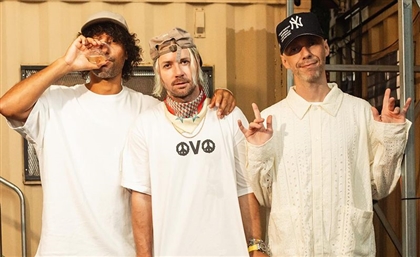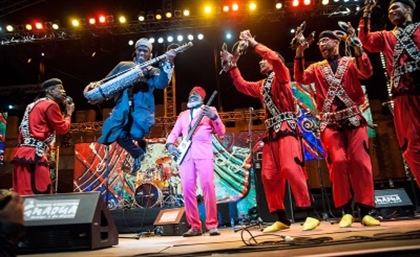Interview: Lebanese Indie Darling Sandra Arslanian on Art, Yasmine Hamdan, and the Music Scene
To coincide with the exclusive premier for their In The End video, we catch up with Sandra Arslanian of Sandmoon for an in depth conversation.
Few bands in the middle east have had a loyal, cult-like following over the years. And even fewer still manage to maintain an authentic sound that’s uniquely their own and remain true to their art.
Growing up in Belgium, Sandra Arslanian played in several bands and clearly soaked up the knowhow and cultivated, even perfected, her aesthetic in the alternative music scene. But as is the case with artists who grow up away from ‘home’, Arslanian’s influences are not stiff or simplistic. Speaking to Scene Noise, she elaborates on them, “melodies I’ve heard growing up and over the years, from classical music to rock, Armenian folk and liturgical hymns to gospel and blues to folk.” Returning to a post-wars Lebanon that’s still as rich in multiple identities as it is its music scene, Arslanian started her band Sandmoon in 2010 and released the “demo-album” Raw. Forward to a few years later, where Sandmoon saw a reshuffle of bandmembers and a reshape in sound, they released their sophomore record Home.
 Sandmoon at Sofar Courtesy of Nathalie Kargaian
Sandmoon at Sofar Courtesy of Nathalie Kargaian
Today, as Sandmoon stands, the band has new members and a new EP titled #InTheEnd with an even newer EP with production by Victor Van Vugt (Nick Cave, Depeche Mode, Cat Power, PJ Harvey). Sandmoon has also won at the 2017 Lebanese Movie Awards for best soundtrack for the Lebanese film Listen.
Scene Noise had the pleasure and privilege to speak to Sandmoon’s Sandra Arslanian ahead of the release of the In The End video, for which Arslanian herself shot protest footage for. The song features a bassline reminiscent of PJ Harvey’s strongest sounds, circa post-punk-90s. It’s that sound that lingers in your eardrum long after the song finishes and sets the mood for the entire day to come. A marching beat, to which your tempo is set.
Seeing as you shot the protest footage for the video, how artistically involved are you in the band’s direction?
Most of the artistic direction comes from me. The band members contribute with their opinion and exchange of ideas. My other occupation is director/producer of corporate films. So I am very much involved with video production. However, I don’t normally shoot. It just happened that I had my camera with me during the 2012 Beirut protests and I thought the images could be used in this music video.
Emotions. Journeys. The passing of time. Love.
Listening to your music, I’m reminded of Portishead, Cat Power and a few other names I love. Tell us about what and who influences you musically and in terms of other forms of art.
Those two artists certainly rank very high in my favorite artists list! Together with PJ Harvey, David Bowie, Feist, Radiohead… But my influences do not end at rock and folk, or similar sounding artists. I think they embody a mixture of sounds and melodies I’ve heard growing up. And over the years, [my influences have included] from classical music to rock, Armenian folk, and liturgical hymns to gospel and blues to folk. As for the writing, I believe you cannot write unless you like to read. So I would definitely count books as a source of inspiration; one of my favorite writers Nagib Mahfouz.
Emotions. Journeys. The passing of time. Love. These are all influnces. And I am very sensitive to what happens around me, socially. Sandmoon’s latest video and song ‘In The End’ asks questions about the society we live in. The video depicts a protest in reverse inviting the viewer and listener to reflect on social movements and global issues.
How would you classify your music?
It’s hard to say. ‘Singer-songwriter’. ‘Indie pop-rock-folk’ if that means anything.
Why was it important to sing in English? Many artists choose it to reach wider audiences. Do you feel that’s true for you?
When I started writing songs, I wasn’t really thinking about an audience (she laughs). I believe that English suits the genre, the style I sing in, the way I sing. I grew up listening to music in English, not exclusively of course but mainly. But yes it’s totally true. Everything in my music is totally true. Otherwise I wouldn’t do it. If I sang what I am singing and the genre I am singing in, in Armenian, Arabic, or French, I would find it to be untrue. I am however contemplating singing in Armenian, but I haven’t really found the right opening.
Do you feel there’s enough space for female-led bands here in the Middle East?
Definitely! Look at Lebanon. There are a lot of female singer-songwriters or female-led duos or bands out there, and it’s very refreshing! Of course, the most well-known Lebanese alternative singer is Yasmine Hamdan. There is also Nadine Khouri, based in London, who collaborated with John Parish on her latest album. And the ones back home are also doing a wonderful job and are successful in their own way. You should check out: Lumi, Postcards, Safar, Project Seer, Youmna Saba, Frida Chehlaoui, Wanderland, Filter Happier,… we even have an all-female rock band: Iklil.
 Sandmoon live Courtesy of Karl F. Sfeir
Sandmoon live Courtesy of Karl F. Sfeir
What challenges do you face as a band in the Middle East?
Besides censorship it’s the challenges we all face, [...] it's the lack of support and the professionalisation of the ‘alternative’ music scene. The audience is very small, and the only way to ‘keep going’ is to ‘get out’. But for that to happen, you need a structured industry, labels, managers… and stamina. There are some individual initiatives but they’re limited for the moment. Some bands have succeeded to export themselves, backed by strong sponsors and management. Like Who Killed Bruce Lee, Wanton Bishops and of course Mashrou’ Leila.
So how has the local indie music scene evolved or changed since Sandmoon’s formation?
I actually find that it did a parabola. It was a bit sparse when I started. A few original bands like Scrambled Eggs, Lumi, The Incompetent, and others. A lot of cover bands. Few events, small events, mainly bar venues. Then there was a flurry 5 years ago, with some very supportive individual or sponsor-led initiatives, events and activities like Beirut Jam Sessions, Beirut Open Stage… and art and music venues opened like Onomatopoeia or Station. Even Anghami now included indie bands, and there’s MidEast Tunes. The scene felt like it was bursting. More and more original bands came to light, younger ones as well. Opportunities and motivation go hand in hand.
Now, I feel like the flurry has subsided a bit. Lessened energy. Some online music portals closed down. But maybe it’s the calm before the next storm…
Here’s hoping. And speaking of storms, where and when was your favorite gig?
When I look back, I have a lot of good memories. A few lesser ones hehe. Generally, there is always something special about each performance. The best performances are when there is a beautiful synergy between the members, and between the band and the audience. To name just two: our EP release gig last year at Station and our Sofar Sounds gig last month.
Sandmoon live Courtesy of Cliff Makhoul
What opinion do you have of Cairo’s alternative music scene? What is it lacking? And how is it different from that of Beirut?
I wish I knew more about the Cairo scene to be able to reply. There is an artist I particularly like, a female artist: Aya Metwalli. You also have a badass all-female metal/punk band, Massive Scar Era!
There are a few regional initiatives, but I think there should be more support, activities and events, collaborations, and especially tour opportunities/facilitation. Locally, we are a small market, so it would be a great way to broaden our horizons and get to know each other.
When can we expect you to perform in Cairo?
I hope very soon… Again, with the right infrastructure and support, it would be easier.
Tell us about the role art (music video, album artwork and typography, and even fashion) plays in your band.
I’ve put a lot of emphasis on music videos, not only because it is part of what I do but also because I believe they are a must nowadays though we are constantly bombarded with all sorts of information on social media and it is becoming more and more difficult to stand out.
Since the ‘Home’ album, I collaborated with local upcoming filmmakers, giving them at the same time a new platform for expression: Selim Mourad, Cherine Khouri, Damoun Ghaoui.
With ‘In The End’, it was mainly shot and edited by me, there is a particular synergy in concept between the song, the video and myself. However, I’ll be working with a young local filmmaker again on the next one.
As for album artwork, it has its share of importance because at the end of the day image and sound go hand in hand. You create a universe and people recognise you through it. I worked with talented local photographers/designers for the two latest albums, Lara Zankoul, Sawsan Nourallah.
Sandmoon live Courtesy of Cliff Makhoul
Sandmoon are:
Sandra Arslanian: vocals/piano/ukulele/electric guitar
Sam Wehbi: acoustic & electric guitar
Georgy Flouty: electric guitar/soundscapes
Ribal Kallab: cello
Raja Rahbani: drums
*Maen Rajab: acoustic and electric guitar (Europe, recordings)
Feast your eyes, and ears, on In The End.
























